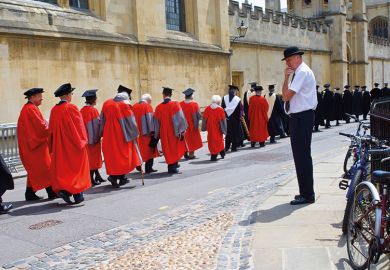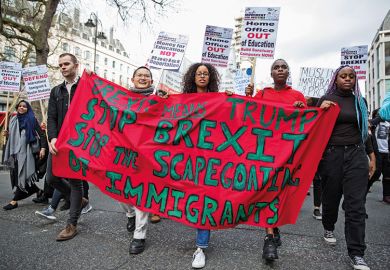The UK and European Union may look to preserve free movement specifically for students after Brexit, but such a deal could “exacerbate existing class conflicts” given inequalities in access to higher education, according to a researcher.
Adam McCann, lecturer in law at the University of Exeter and study abroad academic director in his department, said that leaving freedom of movement rights in place specifically for students – as the House of Commons Education Committee has recommended – was “the most politically feasible deal”.
At present, neither the Conservative Party nor Labour is advocating that the UK remain in the single market – which would require retaining universal freedom of movement and would be the “best option” on student mobility, Dr McCann, who has published on the topic of free movement law and social justice, told Times Higher Education.
But a deal for students only would be “likely to inevitably exacerbate existing class conflict” without close attention to how it is communicated to the public, he added.
The Education Committee said in its report on Brexit and higher education, published in April, that the “best model for EU students is to retain a reciprocal open approach with light touch controls, such as visa-free access, which would enable preservation of a system closely resembling freedom of movement”.
Dr McCann said that after single market membership, “the next best alternative is conditional mobility for students akin (all but in name) to that already set out in the Citizens’ Rights Directive [which defines free movement for European Economic Area citizens]. That would mean maintaining reciprocal free movement between UK and EU citizens upon proof of enrolment on an accredited third-level course and possession of comprehensive sickness insurance.”
But Dr McCann warned that the implications of such a policy would have to be carefully considered.
“There is considerable inequality in terms of access to higher education in this country,” he said. “If the government agree a free movement deal for third-level students and not for others, then it will be – indirectly in a legal sense, but I would say directly in a political sense – providing younger people who are better off with more rights than those who live on the periphery of society.”
While he did not believe that keeping free movement for students would reduce the well-being of non-students, there may nevertheless be a “perception” that this is the case, he added.
“That perception had a big impact in the build-up to the [EU] referendum,” Dr McCann said. “You heard about patient mobility [supposedly] undermining the NHS and benefiting those who can travel abroad, workers coming in undermining the labour market, which of course is seen to impact the working class most. That perception of injustice is enough to create a political backlash.”
Dr McCann said that “not allowing any conditional free movement for young people outside the higher education system” could “fuel a powerful critique already thrown at EU free movement rules; that they only benefit cosmopolitan sectors of society”.
If retaining single market membership is not achievable for the UK and a student mobility deal is reached, there must be efforts to “drill home better than we did [before the referendum] to the general public…that this isn’t a law for the better off, that there are wider economic benefits for the entire country, even if we do have this two-track mobility system”, Dr McCann said.
Register to continue
Why register?
- Registration is free and only takes a moment
- Once registered, you can read 3 articles a month
- Sign up for our newsletter
Subscribe
Or subscribe for unlimited access to:
- Unlimited access to news, views, insights & reviews
- Digital editions
- Digital access to THE’s university and college rankings analysis
Already registered or a current subscriber?







